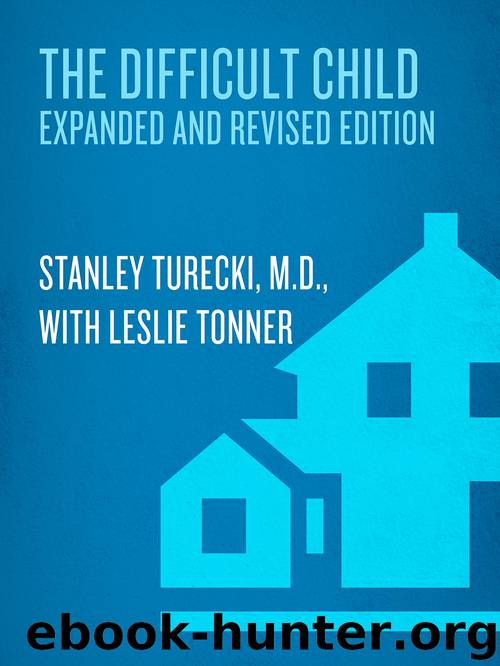The Difficult Child by Stanley Turecki

Author:Stanley Turecki [Turecki, Stanley]
Language: eng
Format: epub
ISBN: 978-0-307-81573-6
Publisher: Random House Publishing Group
Published: 2012-01-25T05:00:00+00:00
DON’T NEGOTIATE: The problem for many parents of difficult children is that the child has become so powerful in their eyes that they feel they’re dealing with another adult, so that they have to explain all their actions and decisions. But with difficult children, you don’t negotiate; you lay down rules. And if your child asks you why and it’s a behavior you consider relevant, answer, “Because that’s the rule.” This is not to say that you should become an arbitrary tyrant. In fact, your new rules will probably make a good deal of sense to your child. The aim here is to assert your authority in an objective and neutral way.
For example, let’s say your daughter spits out food at mealtimes and you have decided this behavior is relevant. You tell her in advance, away from the dinner table, that she’ll have to finish her dinner in the kitchen if she spits out food. She does it once, and you give her the first and only reminder. She does it again.
You do not engage in the following dialogue:
“All right, Jennifer, you need to go to the kitchen now.”
“Mommy, please, I didn’t mean it that time, it was an accident.”
“Well, I really meant what I said.”
“Oh, but Mommy, you gave me this icky meat loaf and it’s so hard to eat, it got stuck in my teeth.”
“You’re supposed to listen to me.”
“Please, Mommy, please, I won’t do it anymore, really, this is the last time.”
“Jennifer—”
“Maybe I could just stay a little while.”
This scene should be replaced with something like the following:
“All right, Jennifer, you were warned. Go to the kitchen.”
“Mommy, please, I didn’t mean it that time.”
“No more discussion.”
“Why?”
“Because you broke the rule.”
Parents often ask, “But what if she won’t do it?” She almost always will if you do it this way. And if she doesn’t obey, you neutrally carry her to the kitchen. The difference is that you stay calm but very firm, and you act quickly instead of going back and forth.
The ideal “political structure” for the family of a difficult child is modeled after a benevolent dictatorship rather than a democracy. The child gets no vote in deciding what his punishment should be. Remember again: You don’t want to become a tyrant, but you do want to be an effective leader.
Download
This site does not store any files on its server. We only index and link to content provided by other sites. Please contact the content providers to delete copyright contents if any and email us, we'll remove relevant links or contents immediately.
Rewire Your Anxious Brain by Catherine M. Pittman(18656)
Talking to Strangers by Malcolm Gladwell(13370)
The Art of Thinking Clearly by Rolf Dobelli(10489)
Mindhunter: Inside the FBI's Elite Serial Crime Unit by John E. Douglas & Mark Olshaker(9344)
Becoming Supernatural by Dr. Joe Dispenza(8217)
Change Your Questions, Change Your Life by Marilee Adams(7783)
Nudge - Improving Decisions about Health, Wealth, and Happiness by Thaler Sunstein(7709)
The Road Less Traveled by M. Scott Peck(7603)
The Lost Art of Listening by Michael P. Nichols(7506)
Mastermind: How to Think Like Sherlock Holmes by Maria Konnikova(7347)
Enlightenment Now: The Case for Reason, Science, Humanism, and Progress by Steven Pinker(7314)
Win Bigly by Scott Adams(7199)
The Way of Zen by Alan W. Watts(6614)
Daring Greatly by Brene Brown(6514)
Big Magic: Creative Living Beyond Fear by Elizabeth Gilbert(5774)
Grit by Angela Duckworth(5615)
Ego Is the Enemy by Ryan Holiday(5450)
Men In Love by Nancy Friday(5240)
The Laws of Human Nature by Robert Greene(5208)
